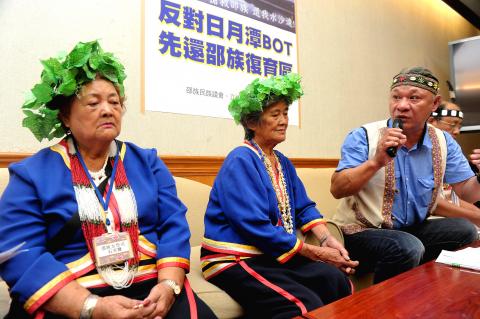Representatives from the Thao people — the original inhabitants of the area surrounding Sun Moon Lake (日月潭) in Nantou County — yesterday criticized the government for giving initial approval to a tourist resort project within their traditional territory on Hsiangshan (向山) without gaining the tribe’s permission in advance.
The build-operate-transfer (BOT) development project for the Hsiangshan tourist resort, financed by Hong Kong’s Bonds Group and given a real-estate development contract in 2009, gained initial approval from the Environmental Impact Assessment (EIA) specialist ad hoc meeting earlier this month.
However, Thao National Council chairman Banu Bagamumu said his tribe, which is now one of the smallest ethnic groups in Taiwan, with only about 700 people, was not consulted. He also accused the Council of Indigenous Peoples (CIP) of not standing up for the Thaos’ rights at the meetings.

Photo: CNA
Taiwan First Nations Party founding chairman Runquan Lhkatafatu (石慶龍), a Thao, said that after the Tourism Development and Promotion Committee last year said the area was not a traditional territory by law, the developer only held an information session for local residents earlier this year, without consulting tribe members.
Under Article 21 of the Aboriginal Basic Act (原住民基本法), developers should consult Aborigines and obtain their consent or participation, and share with them the benefits generated from developments in their territory.
Banu Bagamumu added that in 2008, the Cabinet authorized a plan for a 1,892 hectare Thao culture and living restoration park to be established in the area surrounding the Sun Moon Lake, with an approved budget of NT$553 million (US$18.46 million) over four years, but the county government keeps on postponing the execution of the plan, neglecting the rights to livelihood of the Thao.
“Already, five years have passed, less than 10 percent of the plan has been i executed and we feel despair that we have been fooled and deceived,” Runquan Lhkatafatu said, adding that the Nantou County Government is at fault for refusing to enforce the plan, and the Council of Indigenous Peoples is at fault for being inactive.
In response, deputy director of the council’s Department of Land Management Hsieh Ya-chieh (謝亞杰) said the council has always insisted that the planned development area is within the Thao traditional territory and that the developers must negotiate with tribe members.
Even after the Ministry of Justice said that claiming the traditional territory does not give it legal rights, the council still urged the EIA committee members to consider Article 19 of the EIA Act, which stipulates that activities that will cause significant negative affects to ethnic minority groups’ traditional living should be considered severe environmental impacts, he said, “but the committee members did not accept it.”
Sun Moon Lake National Scenic Area Administration Tourism Bureau secretary Chen Chih-shian (陳志賢) said the bureau proposed the plan in a bid to deal with the increasing number of tourists every year, and also plans to build cables between Hsiangshan and Jiji Township (集集) for gondola lifts.
Banu Bagamumu said that if the government does not respect their tribe and implement the restoration park plan, they will file a lawsuit with the International Court of Justice.

Chinese Nationalist Party (KMT) Chairman Eric Chu (朱立倫), spokeswoman Yang Chih-yu (楊智伃) and Legislator Hsieh Lung-chieh (謝龍介) would be summoned by police for questioning for leading an illegal assembly on Thursday evening last week, Minister of the Interior Liu Shyh-fang (劉世芳) said today. The three KMT officials led an assembly outside the Taipei City Prosecutors’ Office, a restricted area where public assembly is not allowed, protesting the questioning of several KMT staff and searches of KMT headquarters and offices in a recall petition forgery case. Chu, Yang and Hsieh are all suspected of contravening the Assembly and Parade Act (集會遊行法) by holding

PRAISE: Japanese visitor Takashi Kubota said the Taiwanese temple architecture images showcased in the AI Art Gallery were the most impressive displays he saw Taiwan does not have an official pavilion at the World Expo in Osaka, Japan, because of its diplomatic predicament, but the government-backed Tech World pavilion is drawing interest with its unique recreations of works by Taiwanese artists. The pavilion features an artificial intelligence (AI)-based art gallery showcasing works of famous Taiwanese artists from the Japanese colonial period using innovative technologies. Among its main simulated displays are Eastern gouache paintings by Chen Chin (陳進), Lin Yu-shan (林玉山) and Kuo Hsueh-hu (郭雪湖), who were the three young Taiwanese painters selected for the East Asian Painting exhibition in 1927. Gouache is a water-based

Taiwan would welcome the return of Honduras as a diplomatic ally if its next president decides to make such a move, Minister of Foreign Affairs Lin Chia-lung (林佳龍) said yesterday. “Of course, we would welcome Honduras if they want to restore diplomatic ties with Taiwan after their elections,” Lin said at a meeting of the legislature’s Foreign Affairs and National Defense Committee, when asked to comment on statements made by two of the three Honduran presidential candidates during the presidential campaign in the Central American country. Taiwan is paying close attention to the region as a whole in the wake of a

OFF-TARGET: More than 30,000 participants were expected to take part in the Games next month, but only 6,550 foreign and 19,400 Taiwanese athletes have registered Taipei city councilors yesterday blasted the organizers of next month’s World Masters Games over sudden timetable and venue changes, which they said have caused thousands of participants to back out of the international sporting event, among other organizational issues. They also cited visa delays and political interference by China as reasons many foreign athletes are requesting refunds for the event, to be held from May 17 to 30. Jointly organized by the Taipei and New Taipei City governments, the games have been rocked by numerous controversies since preparations began in 2020. Taipei City Councilor Lin Yen-feng (林延鳳) said yesterday that new measures by